- Home
- Editorial
- News
- Practice Guidelines
- Anesthesiology Guidelines
- Cancer Guidelines
- Cardiac Sciences Guidelines
- Critical Care Guidelines
- Dentistry Guidelines
- Dermatology Guidelines
- Diabetes and Endo Guidelines
- Diagnostics Guidelines
- ENT Guidelines
- Featured Practice Guidelines
- Gastroenterology Guidelines
- Geriatrics Guidelines
- Medicine Guidelines
- Nephrology Guidelines
- Neurosciences Guidelines
- Obs and Gynae Guidelines
- Ophthalmology Guidelines
- Orthopaedics Guidelines
- Paediatrics Guidelines
- Psychiatry Guidelines
- Pulmonology Guidelines
- Radiology Guidelines
- Surgery Guidelines
- Urology Guidelines
Type 1 diabetes onset before age ten shortens women's lives by 18 years

According to a new study published in Lancet Type 1 diabetes onset before age ten shortens women's lives by 18 years.than women who do not have diabetes. Men lose almost 14 years of life in the corresponding situation. The lives of patients diagnosed at age 26-30 years are shortened by an average of ten years.
"These are disappointing and previously unknown figures. The study suggests that we must make an even greater effort to aggressively treat patients diagnosed at an early age to reduce the risk of complications and premature death," says Araz Rawshani, a researcher at the Department of Internal Medicine, Sahlgrenska Academy, and the Swedish National Diabetes Registry.
The research is based on extensive material from the registry which has monitored 27,195 individuals with type 1 diabetes for an average of ten years. The group was compared with 135,178 controls from the general population who did not have diabetes, maintaining the same distribution regarding gender, age, and county of residence.
While researchers already knew that type 1 diabetes is associated with a lower life expectancy until now it was unclear whether and how much gender and age at onset of illness affect both life expectancy and the risk of cardiovascular disease.
The probability of severe cardiovascular disease generally proved to be 30 times higher for those who developed type 1 diabetes before the age of ten years than for controls. With a diagnosis of diabetes at the age of 26-30 years, the corresponding risk increased by a factor of six.
One of the highest increases in risk noted in the study involved heart attacks in women who developed type 1 diabetes before the age of ten years. The risk for these women is 90 times higher than for controls without diabetes.
"The study opens up the potential for individualized care. We know with certainty that if we maintain good blood sugar control in these patients, we can lower the risk of cardiovascular damage. This makes it important to carefully consider both evidence-based medications and modern technological aids for blood sugar measurements and insulin administration in patients diagnosed with type 1 diabetes at an early age," says Araz Rawshani.
"At the same time, the study must also be viewed in the light of the tremendous progress that has been made in the past few decades. Management of type 1 diabetes is nowadays highly sophisticated, with modern tools for glucose monitoring, delivery of insulin and management of cardiovascular risk factors. Those who live with diabetes today, and those who will acquire the disease, will enjoy longer and healthier lives in the years to come", says Araz Rawshani.
Type 1 diabetes is one of the most common chronic diseases that affect children in Sweden. The majority are diagnosed between the ages of 10 and 14 years. The number of diagnoses among children is increasing and the percentage is among the highest in the world; Sweden is second after Finland. Between 50,000 and 60,000 people in Sweden suffer from the disease.
"From the patient perspective, this study is tremendously important. Suddenly we can answer questions about complications and life expectancy that we were previously unable to answer. Now there is robust evidence that survival largely depends on the age at which the patient develops the disease, and that there is a difference between men and women," says Araz Rawshani.
For more details click on the link:
DOI:https://doi.org/10.1016/S0140-6736(18)31506-X

Disclaimer: This site is primarily intended for healthcare professionals. Any content/information on this website does not replace the advice of medical and/or health professionals and should not be construed as medical/diagnostic advice/endorsement or prescription. Use of this site is subject to our terms of use, privacy policy, advertisement policy. © 2020 Minerva Medical Treatment Pvt Ltd